Outdoor Program Celebrates 50 Years of Adventure
Since 1975, Whitman's beloved OP has inspired generations of students to explore and fall in love with the outdoors
By Pam Moore
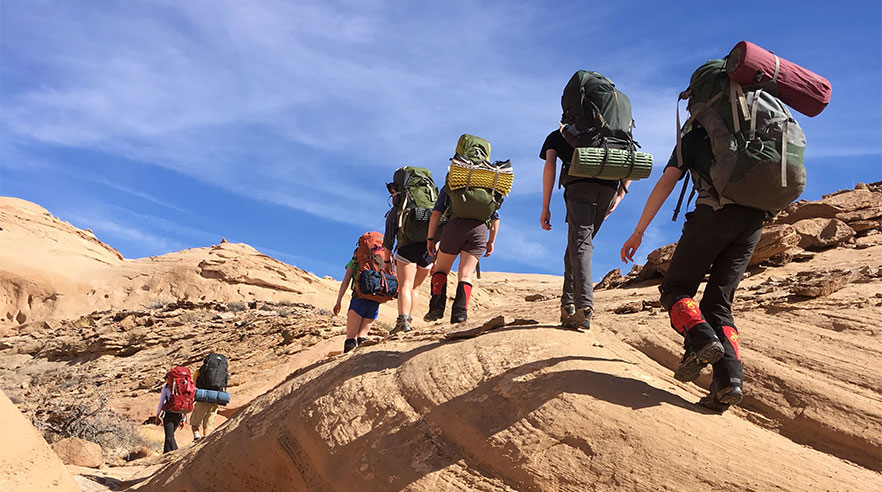
Off the beaten path. Whitman students hike through Robbers Roost in southern Utah during an Outdoor Leadership course.
It was spring break 2012 when Whitman College Director of Outdoor Programs Brien Sheedy’s Glacier Mountaineering class set out for Mount Hood, about 50 miles east of Portland, Oregon. They planned to summit the peak, the highest in Oregon, but when a freak snowstorm rolled in, the group was forced to switch gears. Their lives depended on it.
Neither Sheedy nor his co-leader, Craig VanHoy—both expert alpinists who have guided mountain expeditions all over the globe—expected to experience that kind of squall with a group of relatively inexperienced college students. “That was as bad as any storm we’d ever seen anywhere in the world,” Sheedy recalls.
“The snow was falling at a rate of an inch per hour, but the wind pattern caused a 10-foot snowdrift to build on top of our camp,” he says. “We stayed up all night shoveling just to keep our tent from collapsing. Then we dug in to create a snow shelter.”
“I like to say, I teach and coach life skills through the lens of outdoor activities
”
Brien Sheedy, Director of Outdoor Programs
By the time the storm passed, everyone was thoroughly exhausted, and the avalanche risk was high, so the group abandoned their attempt at the summit—but Sheedy remembers the trip as an unequivocal success.
“We turned what could have been a life-or-death situation into this very real, exhilarating challenge for these students to overcome. And I am so proud of how they handled it and what they learned in the process,” he says.
More than 10 years later, the memory is etched in Sheedy’s mind like it was yesterday. The same goes for the students, he says. “The first-years talked about it for all of their four years on campus. And to this day, when I interact with students who were on that trip, they still bring it up.”
Such memorable experiences are not unusual for the Outdoor Program (OP), which creates opportunities for Whitman students to explore more than just outdoor recreation—to build teamwork, leadership skills, outdoor skills and lifelong friendships.
An Idea Comes to Life
Fittingly, a program that is now a hub of student life on Whitman’s campus was the brainchild of a Whitman student.
When Andy Dappen ’76 arrived at Whitman in the fall of 1972, the school had what he calls a “not very active” Outing Club that took one or two trips per year.
“People thought Walla Walla was boring,” says Dappen. But for people who love the outdoors, the small town in the foothills of the Blue Mountains, south of the rolling Palouse hills, and nearby the Columbia River is “nicely situated,” he says.
By his junior year, with much of the club leadership having graduated, Dappen saw an opportunity.
If he could create a college-supported Outdoor Program with activities that were accessible to a range of skill and experience levels, he was confident it would enhance the Whitman experience on multiple levels. “I also thought, maybe I could create a job for myself,” he recalls.
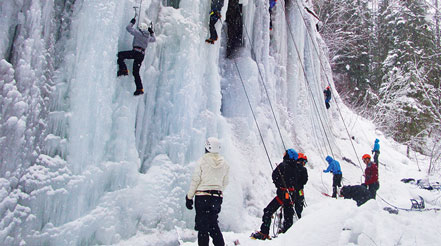
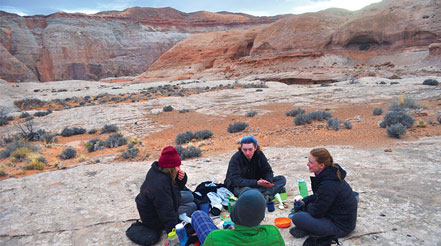
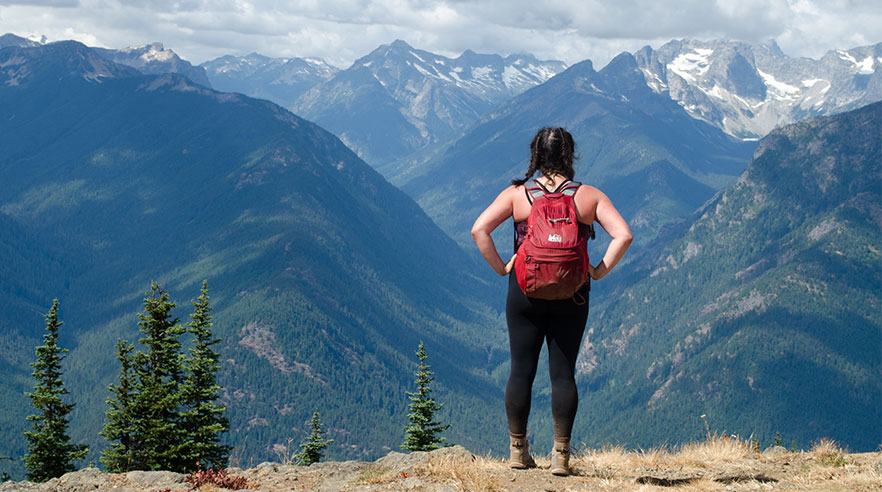
‘A Springboard for Personal Growth’
Dappen was inspired to give his peers access to the kinds of outdoor experiences that had taught him valuable lessons in leadership, communication and resilience.
“My brother [Alan Dappen ’74] and I grew up in the days when your parents kicked you out the door and you didn’t come home until dark,” he says. Between childhood experiences exploring the lakes and rivers he grew up around and exposure to sports like hiking, mountaineering and cross-country skiing in high school, he developed a passion for the wilderness.

“For me, being in the outdoors fires on so many cylinders,” he says. “There’s beauty … and danger. There’s self-reliance and the need to rely on the people you’re with. Outdoor experiences were a springboard for my personal growth, and I felt other people would find value in them if they got involved.”
He was also confident that outdoor activities would be a quick route to creating community among his peers. “Socially, I was a little shy about putting myself out there. But when you’re driving, hiking and setting up camp together, it’s a more organic way to create a friendship,” he says.
Dappen pitched the idea of a Whitman-funded Outdoor Program to the then-administration, including Student Center Director Vern Solbach and President Robert Skotheim, and in the summer of 1975, the college hired Dappen to establish the program.
An Instant Success
True to his vision of offering a broad selection of activities, early Outdoor Program offerings included everything from berry picking to volcano climbs to hikes of various difficulty levels. The response was excellent, with students quickly signing up for every type of trip, says Dappen.
A year later, after Dappen graduated with an Economics degree, a prestigious Watson Fellowship allowed him to study European approaches to outdoor leadership training programs in Austria, Switzerland, Germany and Great Britain. “I came back with a much broader sense of how the outdoors could be used” to teach a variety of skills, he says.
“Outdoor experiences were a springboard for my personal growth, and I felt other people would find value in them if they got involved.
”
Andy Dappen ’76
He was able to put those insights into action in 1979 when he was hired as the full-time Student Activities Director at Whitman, where one of his main responsibilities was managing the Outdoor Program. He stayed for three and a half years before leaving to pursue other outdoor industry opportunities, first as a product developer, then as an outdoor journalist whose work appeared in Outside, National Geographic Adventure and Backpacker magazines.
Thinking back to that time, Dappen feels grateful for the Whitman experiences that influenced his career trajectory. He’s also impressed by how much the program has evolved over the years. “It’s truly remarkable how it’s grown,” he says, crediting Patty Picha, who took the position after he left, and Brien Sheedy, for all they did to expand it.
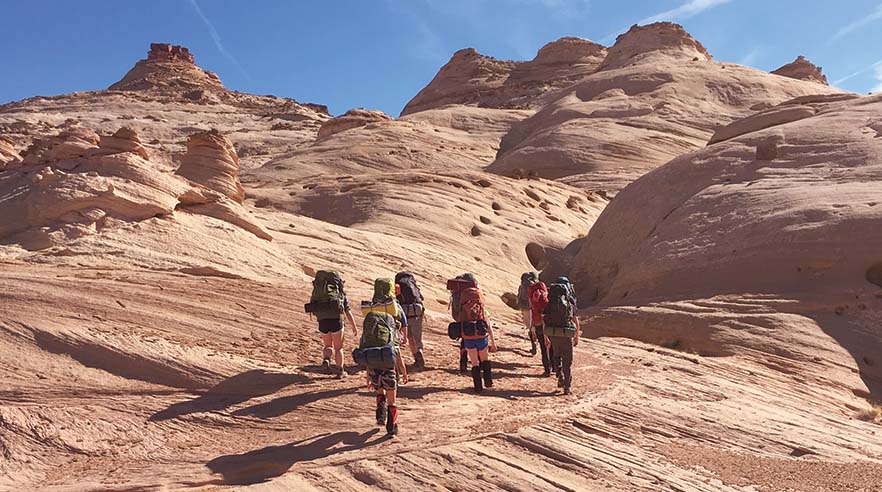
The Outdoor Program Today
The Outdoor Program has grown exponentially over the past 50 years and become a vital campus resource—now under the direction of Sheedy and Assistant Director of Outdoor Programs Stuart Chapin.
Today, it features a state-of-the-art Climbing Center; a schedule bursting with weekend trips; and over 20 Sports Studies, Recreation and Athletics (SSRA) courses per semester—with three full-time staff members and dozens of students taking leadership roles in courses, trips and the Climbing Center. The program is also home to a rental shop managed by Lish Gutierrez, which is open to the Whitman and Walla Walla communities, including dedicated bike and ski shops. And the program coordinates visiting speakers, instructional seminars, film festivals and other special events on campus.
 While the initial goal of creating opportunities to engage with the outdoors remains intact, “We have more diverse offerings than we did 50, or even 20 years ago,” says Sheedy, who joined the staff in 2001 as the Director of Outdoor Programs and Senior Adjunct Lecturer of Sport Studies. While the Outdoor Program now offers outings including sea kayaking and mountain biking, climbing and wilderness first responder certifications, and courses in winter and glacier mountaineering, there are also adaptive activities and equipment for students with disabilities and options for those who don’t run on adrenaline, including stargazing, birding, and plant identification, to name a few, says Sheedy.
While the initial goal of creating opportunities to engage with the outdoors remains intact, “We have more diverse offerings than we did 50, or even 20 years ago,” says Sheedy, who joined the staff in 2001 as the Director of Outdoor Programs and Senior Adjunct Lecturer of Sport Studies. While the Outdoor Program now offers outings including sea kayaking and mountain biking, climbing and wilderness first responder certifications, and courses in winter and glacier mountaineering, there are also adaptive activities and equipment for students with disabilities and options for those who don’t run on adrenaline, including stargazing, birding, and plant identification, to name a few, says Sheedy.
And students are responsible for nearly every aspect of the program, he says. Each semester, the Climbing Center employs up to 40 students. Meanwhile, there are roughly 25 student trip leaders per semester, the rental shop employs up to 12 students per semester, and there are 24 student instructors responsible for SSRA courses.
Opening Up the Outdoors
Thanks to the Bob Carson Outdoor Fund (BCOF), all Whitman students now have the chance to experience the outdoors and become empowered leaders and advocates for adventure. The BCOF, established in 2012 and named in honor of longtime trip leader and Professor Emeritus of Geology and Environmental Studies Bob Carson, was designed to give every Whittie the chance to engage with the wilderness, regardless of trip costs.
“It was a wonderful way to pause and appreciate the beauty of the world around us and connect with friends, old and new.
”
Ellen Haney ’25 after an OP kayaking trip
Unlike Dappen’s peers, many of whom yearned for the bustle of a bigger city, the current increasingly diverse student body “arrives on campus with intrigue about the location,” says Sheedy. “And because of the BCOF, they can try a lot of things that wouldn’t normally be available to them.”
To that end, the program gives each student a $150 credit each academic year to put toward an Outdoor Program trip and associated equipment (all of which is available for rent at reasonable prices in the rental shop). “We’ve been working hard to remove barriers for students, so they can also use their trip credit toward any extras they might need,” says Sheedy. “Whether that’s fleece pants, a rain jacket or a sleeping bag, they can apply their trip credit toward those rentals too.”
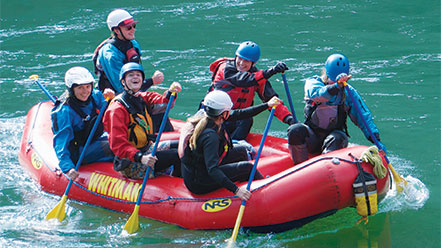
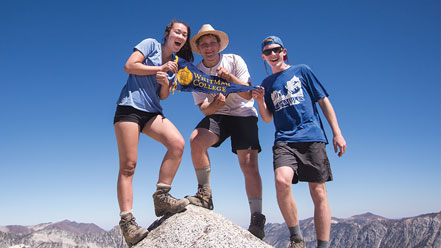
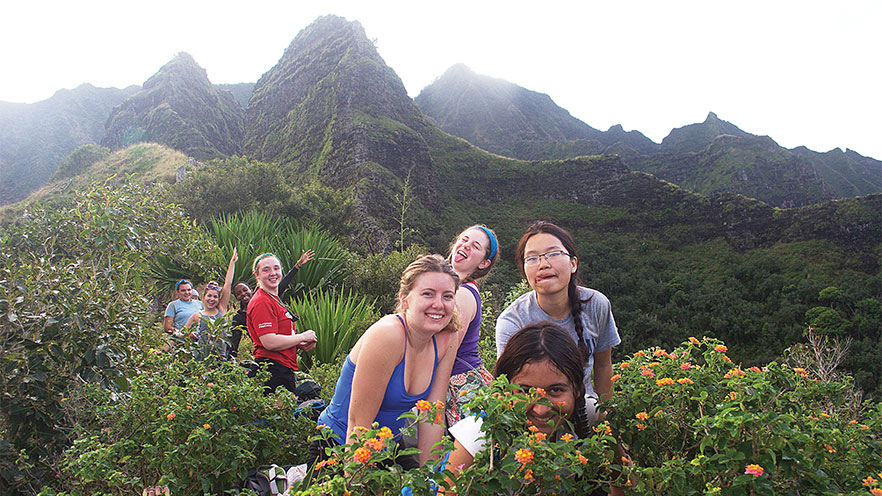
The Transformative Power of Nature
“Whitties might sign up for a trip because it sounds fun and cool,” says Sheedy. “But they end up getting a lot more out of it than they expected.” As Dappen envisioned decades ago, getting out of their comfort zones and into the outdoors gives students the unique chance to learn important lessons about themselves, teamwork and resilience.
And what students learn from the outdoors—whether that’s effective communication, the importance of preparation or how to break an imposing challenge into manageable chunks—serves them in every aspect of life. “I like to say, I teach and coach life skills through the lens of outdoor activities,” says Sheedy.
The epic Mount Hood trip was a perfect example of his credo. “We don’t want that kind of thing all the time,” he says. But on that long, freezing night, “The students tested tolerance for adversity, they didn’t give up, and they supported each other,” says Sheedy. “In nature, we don’t have to contrive these learning experiences. They’re real and they’re inevitable.”
Help Keep the Legacy Alive
You can give more Whitties the chance to participate in Outdoor Program experiences, where they’ll make memories and develop lifelong skills. Make a gift to the Bob Carson Outdoor Fund—or email development@whitman.edu to explore a gift to help endow support for the OP.
The 70 Project: Defying Age
Andy Dappen ’76 turned 70 in the summer of 2024—and his ambitious celebration took 12 months.
“At a time in life when most people find their worlds contracting, I wanted to pursue goals that keep my life expanding,” Dappen says.
As a lifelong outdoorsman who shows little sign of slowing down, Dappen designed what he calls “The 70 Project,” an endeavor that spanned his entire 70th year and included goals such as:
- Climbing 70 peaks
- Mountain biking 70 days
- Skiing 70 times
- Pursuing outings with 70 different people
- Taking 70 outings with his wife
- Logging 280,000 vertical feet (70K × 4)
- Traveling 1,400 nonmotorized miles (70 × 20)
- Reading 35 books (70 ÷ 2)
- Playing Ultimate Frisbee for 70 evenings
The pursuit wasn’t just about broadening his own range of experiences. Dappen hoped his stretch goals would inspire his peers to embark on ambitious, passion-fueled projects of their own. “Aging is inevitable,” he says, “but acting old is a choice.”